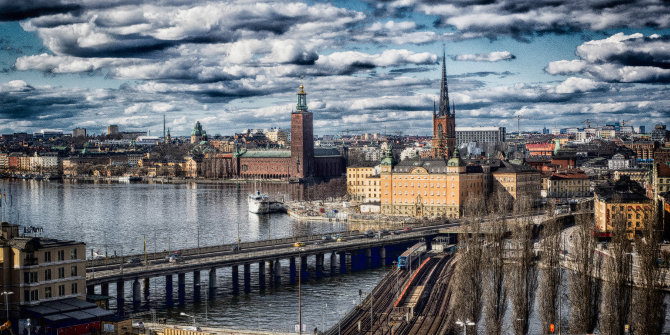Voters across the EU head to the polls on 6-9 June for the 2024 European Parliament elections. Here are twenty stories to watch as the results come in.
This article is part of a series on the 2024 European Parliament elections. The EUROPP blog will also be co-hosting a panel discussion on the elections at LSE on 6 June.
1. Who has the momentum in Austria?
The European Parliament election in Austria will have important implications for the Austrian legislative elections to be held later this year. Jakob-Moritz Eberl and Eva Zeglovits write that all three main parties have recently undergone leadership changes, with the Eurosceptic and populist-right Freedom Party currently holding a lead in the polls.
2. Is there deadlock ahead in Belgium?
Belgium is holding simultaneous federal, regional and European elections. Philippe Mongrain and Karolin Soontjens explain that while it is difficult to predict the outcome, the tide seems to have turned in favour of radical parties on both sides of the ideological spectrum.
3. Can Bulgaria overcome its prolonged political instability?
Bulgaria’s European Parliament election will take place alongside yet another parliamentary election – the sixth it has held since 2021. Petar Bankov argues that if the elections fail to produce a solution, there could be a further deterioration in the relationship between society and the country’s political institutions.
4. Will Croatia’s new government pass its first test?
The European Parliament elections come less than two months after Croatia’s 2024 parliamentary election. Ivor Sokolić suggests much of the debate from the parliamentary election is likely to continue during and after the European vote.
5. What impact will Turkish Cypriot voters have in Cyprus?
Turnout among Turkish Cypriot voters is expected to increase due to several Turkish Cypriot candidates running with Greek Cypriot political parties. As Yiannos Katsourides notes, existing polls do not account for Turkish Cypriot voters, leaving uncertainty regarding their voting intentions and preferences.
6. Is Finland becoming more polarised?
Once considered boring, Finnish politics has become increasingly lively since the National Coalition Party’s victory in 2023. As Tapio Raunio writes, the government led by Prime Minister Petteri Orpo – which brings together the National Coalition Party, the Finns Party, the Swedish People’s Party, and the Christian Democrats – has been described as the most right-wing in Finnish history.
7. What will the vote tell us about the next French presidential election?
Marine Le Pen’s Rassemblement National currently tops the polls in France. Marta Lorimer argues that while many will be tempted to interpret the outcome as a sign that Le Pen could win the 2027 presidential election, it would be ill-advised to read too much into the results.
8. Will Eurosceptic parties make gains in Germany?
As the largest EU member state, the German results will have a sizeable impact on the balance of power in the European Parliament. Ann-Kathrin Reinl and Stefan Wallaschek explain that against the background of the ongoing war in Ukraine and the Israel-Palestine conflict, Germany’s political landscape is now exceptionally heated.
9. Can Péter Magyar’s new party challenge Fidesz in Hungary?
Magyar’s party, Tisza, has rapidly increased its support in opinion polls ahead of the election. Zsolt Enyedi indicates the result could now have important implications for both Hungary and the European Parliament.
10. Who will win in Ireland?
Independent candidates are expected to receive a large share of the vote in Ireland. Rory Costello notes that while Sinn Féin once looked set to win a clear victory at the election, the emergence of immigration as a campaign issue has seen the party lose support in the polls.
11. Will Giorgia Meloni embrace her “pragmatic” side?
Despite Italian Prime Minister Giorgia Meloni’s once vehement opposition to Brussels, relations between Italy and the EU’s institutions are now increasingly positive. Leila Simona Talani argues the Italian case demonstrates how radical right-wing parties can drastically change their approach to the EU, while Marina Cino Pagliarello indicates Meloni could soon face a choice between leading the opposition in the European Parliament or embracing her pragmatic side in the hope of securing a greater voice over key decisions.
12. Will scandals damage support for the ruling New Unity alliance in Latvia?
Krišjānis Kariņš resigned as Foreign Minister in April following criticism over his use of private jets. Daunis Auers says all eyes will be on the performance of Kariņš in the election as a lack of political support from his party could see him contemplate breaking away from New Unity.
13. Can the Nationalist Party close the gap to Labour in Malta?
Malta’s 2022 election exposed the uphill struggle the Nationalist Party face in bridging the gap to the Labour Party, which is widely expected to win a majority of votes in the country’s European election. However, as Jean Claude Cachia writes, the real test will be whether the Labour Party can retain its four seats or whether the Nationalist Party will manage to reduce the gap to its rival and potentially win a third seat.
14. Will Geert Wilders’ PVV top the vote in the Netherlands?
Geert Wilders’ victory in the 2023 Dutch general election might suggest Euroscepticism is on the rise in the Netherlands. Yet as Nick Martin and Andre Krouwel show, the European ideal still retains strong support among Dutch voters.
15. Who will win in Poland?
Donald Tusk’s Civic Platform are aiming to finish above Law and Justice after failing to do so at the Polish local elections in April. As Aleks Szczerbiak explains, Tusk would like to secure the party’s role as Poland’s leading political force after winning power in the 2023 Polish parliamentary election.
16. Is the two-party system finished in Portugal?
The European Parliament election in Portugal will come just a few months after the 2024 Portuguese legislative election. Research by Lea Heyne and Luca Manucci suggests increasing levels of affective polarisation signal the end of a two-party system and the beginning of a three-party system made up of the mainstream right, the radical right and the left.
17. Are anti-system parties set for a breakthrough in Romania?
The European Parliament election in Romania will be just one of four major elections held in the country this year. Alexandru Damian notes that concerns over corruption and poor governance have fostered disillusion with the country’s mainstream and increased support for anti-system parties.
18. How will Janez Janša’s SDS perform in Slovenia?
Janša has sought to make the European election a referendum on the Slovenian government led by Robert Golob’s Freedom Movement. As Tim Haughton and Alenka Krašovec explain, a major plank of Golob’s appeal when he won power was his background as a successful manager of an energy company. But the past two years have shown the stark differences between running a business and managing a coalition government.
19. Who will top the vote in Spain?
Protests by Spanish farmers, questions over the future of Pedro Sánchez, and the fallout from May’s Catalan regional elections have all featured prominently in the leadup to Spain’s European Parliament election. Paul Kennedy and David Cutts argue the election could have important ramifications for Spanish politics.
20. How politicised is the EU in Sweden?
The environment and defence have been the two most important issues in the campaign in Sweden. Linda Berg and Jonathan Polk indicate that while domestic politics continues to play a prominent role in Sweden’s European elections, there is some evidence of European contestation emerging around Swedish parties.
Note: Featured image credit: CC-BY-4.0: © European Union 2024 – Source : EP






